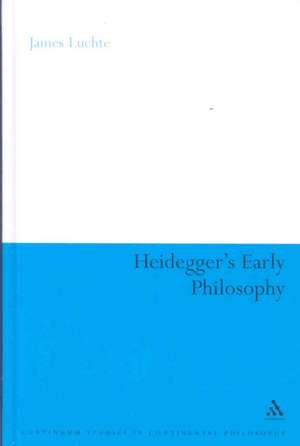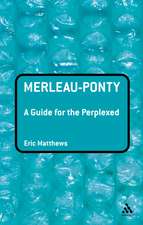Heidegger's Early Philosophy: The Phenomenology of Ecstatic Temporality: Continuum Studies in Continental Philosophy
Autor Dr James Luchteen Limba Engleză Hardback – 14 aug 2008
In Heidegger's Early Philosophy, James Luchte sets forth a comprehensive examination of Heidegger's phenomenology between 1924 and 1929, during which time Heidegger was largely concerned with a radical temporalization of thought. The book seeks to re-construct Heidegger's radical phenomenology through an interpretation of all his published and unpublished works of the period, including the 1920s lecture courses and his published works, Kant and the Problem of Metaphysics and his magnum opus, Being and Time. The book also explores Heidegger's relationship with other philosophers, such as Husserl, Kant and Leibniz, with respect to the question of the relationship of thought and temporality.
The book addresses a significant void in the treatment of Heidegger's early phenomenology, emphasizing the importance of Heidegger's lecture courses and other works besides Being and Time, and thereby investigates the many fragments of Heidegger's work so as to more fully comprehend the meaning and significance of the original project. James Luchte makes an extraordinary and hugely important contribution to the field of Heidegger Studies.
The book addresses a significant void in the treatment of Heidegger's early phenomenology, emphasizing the importance of Heidegger's lecture courses and other works besides Being and Time, and thereby investigates the many fragments of Heidegger's work so as to more fully comprehend the meaning and significance of the original project. James Luchte makes an extraordinary and hugely important contribution to the field of Heidegger Studies.
| Toate formatele și edițiile | Preț | Express |
|---|---|---|
| Paperback (1) | 256.29 lei 6-8 săpt. | |
| Bloomsbury Publishing – 26 oct 2011 | 256.29 lei 6-8 săpt. | |
| Hardback (1) | 948.66 lei 6-8 săpt. | |
| Bloomsbury Publishing – 14 aug 2008 | 948.66 lei 6-8 săpt. |
Din seria Continuum Studies in Continental Philosophy
- 23%
 Preț: 179.10 lei
Preț: 179.10 lei - 31%
 Preț: 890.14 lei
Preț: 890.14 lei - 23%
 Preț: 262.25 lei
Preț: 262.25 lei - 31%
 Preț: 890.55 lei
Preț: 890.55 lei - 22%
 Preț: 949.17 lei
Preț: 949.17 lei - 14%
 Preț: 1007.12 lei
Preț: 1007.12 lei - 31%
 Preț: 889.88 lei
Preț: 889.88 lei - 22%
 Preț: 1007.12 lei
Preț: 1007.12 lei - 22%
 Preț: 888.58 lei
Preț: 888.58 lei -
 Preț: 256.02 lei
Preț: 256.02 lei - 22%
 Preț: 949.17 lei
Preț: 949.17 lei - 22%
 Preț: 948.91 lei
Preț: 948.91 lei - 31%
 Preț: 891.51 lei
Preț: 891.51 lei - 22%
 Preț: 948.34 lei
Preț: 948.34 lei - 22%
 Preț: 256.49 lei
Preț: 256.49 lei - 14%
 Preț: 946.53 lei
Preț: 946.53 lei - 31%
 Preț: 890.72 lei
Preț: 890.72 lei - 14%
 Preț: 1005.98 lei
Preț: 1005.98 lei - 14%
 Preț: 889.88 lei
Preț: 889.88 lei - 14%
 Preț: 947.54 lei
Preț: 947.54 lei - 31%
 Preț: 947.54 lei
Preț: 947.54 lei - 22%
 Preț: 1005.41 lei
Preț: 1005.41 lei - 22%
 Preț: 947.11 lei
Preț: 947.11 lei - 23%
 Preț: 255.94 lei
Preț: 255.94 lei - 31%
 Preț: 948.34 lei
Preț: 948.34 lei - 22%
 Preț: 947.54 lei
Preț: 947.54 lei - 22%
 Preț: 946.53 lei
Preț: 946.53 lei - 22%
 Preț: 947.54 lei
Preț: 947.54 lei - 22%
 Preț: 889.39 lei
Preț: 889.39 lei - 22%
 Preț: 257.50 lei
Preț: 257.50 lei - 22%
 Preț: 1005.41 lei
Preț: 1005.41 lei - 31%
 Preț: 889.88 lei
Preț: 889.88 lei - 31%
 Preț: 947.94 lei
Preț: 947.94 lei - 22%
 Preț: 947.11 lei
Preț: 947.11 lei - 22%
 Preț: 947.86 lei
Preț: 947.86 lei - 14%
 Preț: 891.51 lei
Preț: 891.51 lei - 22%
 Preț: 948.10 lei
Preț: 948.10 lei - 31%
 Preț: 891.36 lei
Preț: 891.36 lei - 22%
 Preț: 1005.72 lei
Preț: 1005.72 lei - 31%
 Preț: 888.97 lei
Preț: 888.97 lei - 14%
 Preț: 947.54 lei
Preț: 947.54 lei - 19%
 Preț: 373.30 lei
Preț: 373.30 lei - 11%
 Preț: 373.30 lei
Preț: 373.30 lei - 22%
 Preț: 1007.62 lei
Preț: 1007.62 lei - 22%
 Preț: 1005.72 lei
Preț: 1005.72 lei - 22%
 Preț: 946.53 lei
Preț: 946.53 lei - 22%
 Preț: 948.34 lei
Preț: 948.34 lei
Preț: 948.66 lei
Preț vechi: 1216.25 lei
-22% Nou
Puncte Express: 1423
Preț estimativ în valută:
181.55€ • 188.10$ • 151.52£
181.55€ • 188.10$ • 151.52£
Carte tipărită la comandă
Livrare economică 21 martie-04 aprilie
Preluare comenzi: 021 569.72.76
Specificații
ISBN-13: 9781847062970
ISBN-10: 1847062970
Pagini: 224
Dimensiuni: 156 x 234 x 23 mm
Greutate: 0.49 kg
Editura: Bloomsbury Publishing
Colecția Continuum
Seria Continuum Studies in Continental Philosophy
Locul publicării:London, United Kingdom
ISBN-10: 1847062970
Pagini: 224
Dimensiuni: 156 x 234 x 23 mm
Greutate: 0.49 kg
Editura: Bloomsbury Publishing
Colecția Continuum
Seria Continuum Studies in Continental Philosophy
Locul publicării:London, United Kingdom
Caracteristici
Concentrates particularly on Heidegger's early work, including his magnum opus, Being and Time.
Cuprins
Introduction
Part I: The Phenomenon of Ecstatic Temporality
Part I: The Phenomenon of Ecstatic Temporality
1. Indications of Ecstatic Temporality
2. An Indigenous Conceptuality of Dasein
3. Temporal Characters of Being-in-the-World
4. Ecstatic Temporality and the Meaning of Being
5. Kant's Thesis about Being and Existence
Part II: Destruktion of Ecstatic Temporality
6. The Retrieval of Ecstatic Temporality
7. The Excavation of Ecstatic Temporality
8. The Articulation of Finite Knowing
9. Transcendental Imagination and Ecstatic Temporality
Part III: Topos of Ecstatic Temporality
10. The Metaphysical Foundations of Logic
11. The 'Unity' of Ecstatic Temporality
12. The Riddle of Fallenness, the Building Site of Care and Temporality
13. Temporality as the Ontological Meaning of Care
Conclusion: The Circle of Finitude
References and Further Reading
Notes
Index
Recenzii
Mention -Book News, February 2009
"... it is the merit of this book to persistently return time and again to the radical and utter finitude of existence that confronts us in the 'event' of our original temporality, opening as it does onto the groundless abyss of nothingness and exposing us to the awesome and overwhelming face of 'matters themselves'" - Notre Dame Philosophical Reviews
"... it is the merit of this book to persistently return time and again to the radical and utter finitude of existence that confronts us in the 'event' of our original temporality, opening as it does onto the groundless abyss of nothingness and exposing us to the awesome and overwhelming face of 'matters themselves'" - Notre Dame Philosophical Reviews
Notă biografică
James Luchte is Lecturer of Philosophy and Programme Co-ordinator of the MA in European Philosophy at the University of Wales, Trinity St. David, in Wales. His other publications include The Peacock and the Buffalo: The Poetry of Nietzsche (translator), Pythagoras and the Doctrine of Transmigration, Heidegger's Early Philosophy: The Phenomenology of Ecstatic Temporality, Nietzsche's Thus Spoke Zarathustra: Before Sunrise (editor) and Kant's Critique of Pure Reason: A Reader's Guide (all Continuum). He has also published numerous articles on various topics in European Philosophy.














